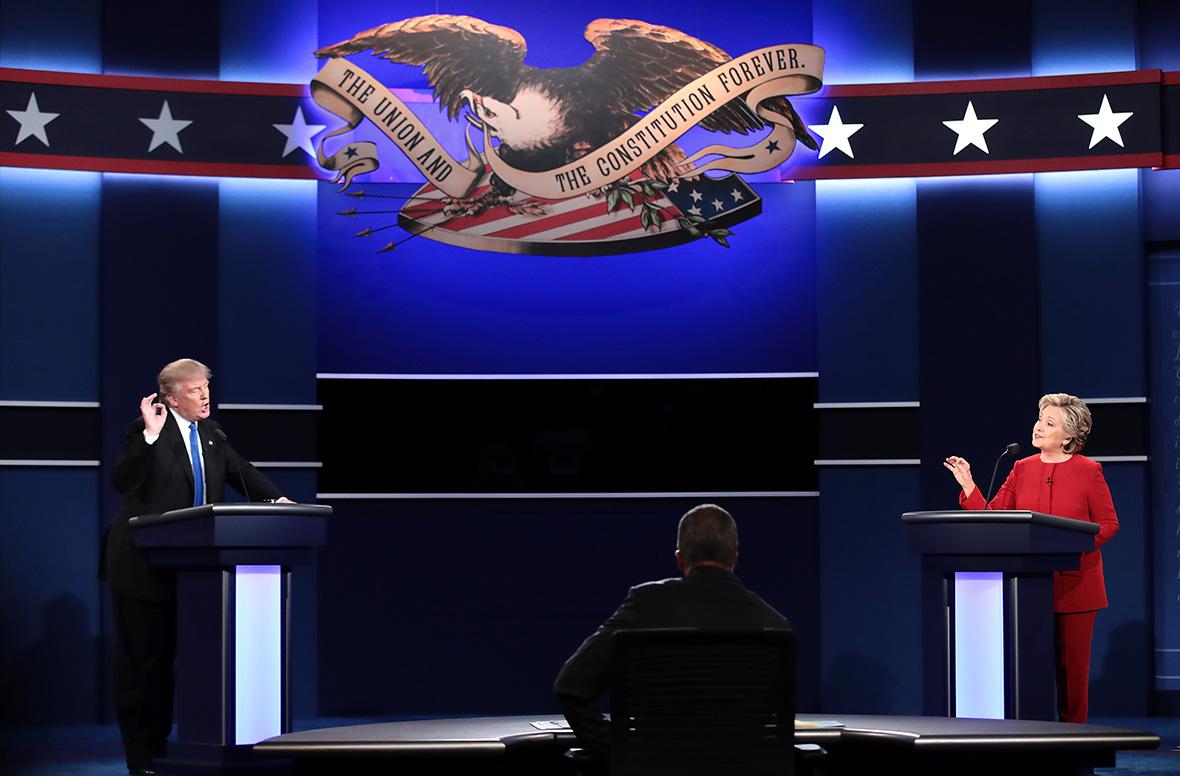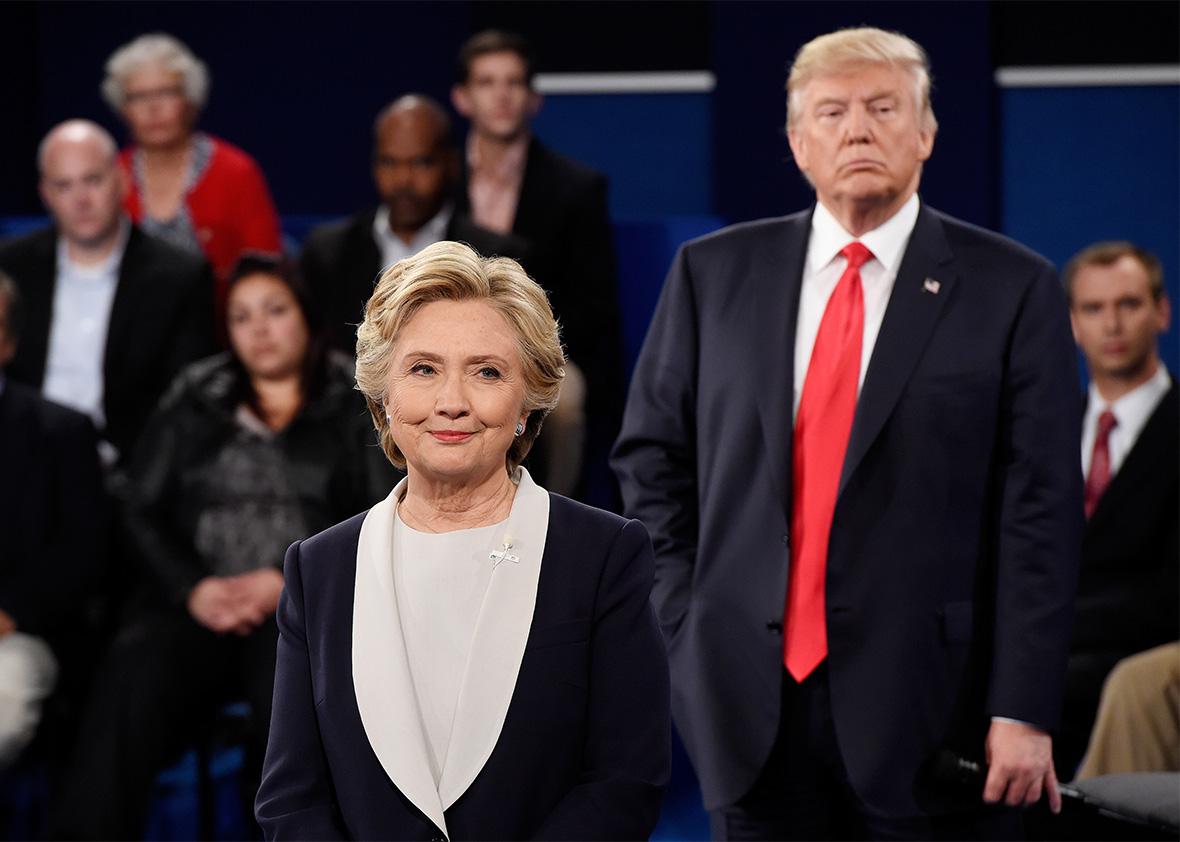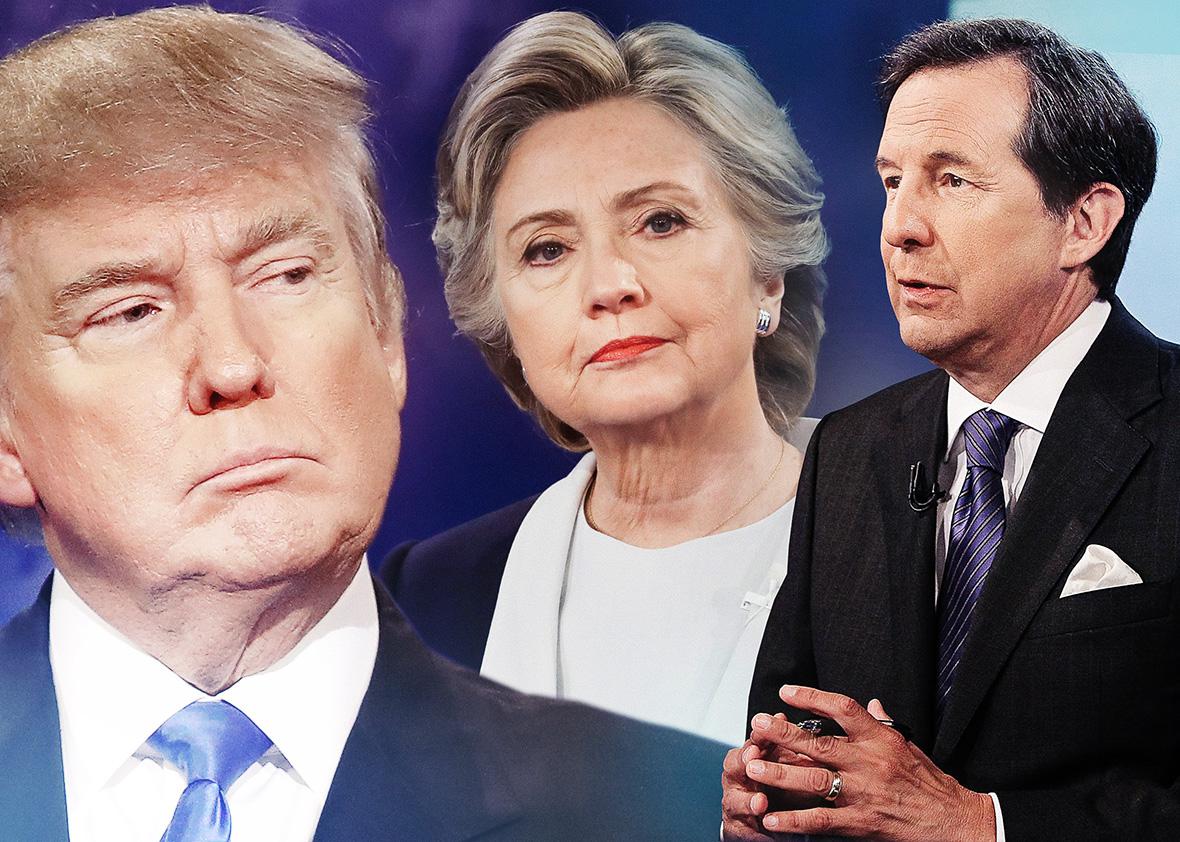Wednesday night is the last debate of the most difficult, depressing, maddening election cycle in recent American history. It is probably also the last chance for a television anchor—in this case, Fox News’ Chris Wallace—to ask Hillary Clinton and Donald Trump pointed, aggressive, illuminating questions in front of a massive audience of likely voters. So what should he ask? Below is Slate’s best attempt to articulate what we think Trump and Clinton should still have to answer for. Some of these questions are grounded in the events of the past week, some are what we wish the candidates would be asked were we living in an alternate universe where this election was not such a total shit show. Some are single questions, and others have follow-ups because there should be follow-ups, Chris Wallace. All of them are important.
Michelle Goldberg, columnist:
I would like Chris Wallace to ask Donald Trump, “Why don’t people like you?”
Over her many decades in public life, Hillary Clinton has, again and again, been asked versions of this same humiliating question. In a 2008 primary debate, the moderator put it this way: “What can you say to the voters of New Hampshire on this stage tonight who see your résumé and like it but are hesitating on the likability issue?” It’s certainly true, as I’ve written about at length, that a lot of people really hate Clinton. But do you know who else people really hate? Donald Trump! Somehow, though, the widespread revulsion he inspires is never seen as something that he has to either account or apologize for.
Obviously, likability is far less important than the many matters of public policy at stake in this election. But let’s be honest—to attempt a substantive political exchange with Trump is a category error. Facts are irrelevant for him; emotion is what matters. So out of fairness, I’d like to see him asked about the emotional response he elicits, just as Clinton so often is. It’s telling, in this sexual Rorschach test of an election, that we only expect one of the two candidates to be responsible for the way they make people feel.
Jamelle Bouie, chief political correspondent:
Given that Hillary Clinton is most likely to be president, I’d want Chris Wallace to press her on her opening plans as chief executive. In her first 100 days, what does Clinton intend to introduce to Congress? Why that legislation over other priorities? If she can’t find cooperation from, say, a Republican House, what is she willing to sacrifice or concede to move that legislation forward? And if she’s unwilling to make those sacrifices or concessions, does she intend to follow President Obama’s lead and use the power of the executive branch to make progress on that concern? How, and as a follow-up to “how?,” is she worried about the long-term implications of that kind of turn to the executive branch, to the exclusion of legislative action? Does she worry whether it weakens separation of powers and concentrates too much authority in the executive branch?
Leon Neyfakh, staff writer:
It’s conventional wisdom at this point that Trump’s rise has revealed something ugly about the American people that a lot of us didn’t fully understand before. More specifically, it has revealed that a large chunk of the populace is consumed with profound anger and racial resentment. I’d like Wallace to ask Clinton whether this revelation has in any way changed the goals and hopes she would bring with her to the White House. Does the fact that so many Americans have shown a willingness to support an authoritarian alter her conception of the country? Insofar as Trump’s popularity is a symptom of problems a president could help fix, what does she think those problems are, and how would she fix them?
I would ask Trump to narrate, from morning to night, how he imagines a typical day in the life of the president. What order of business will he attend to first thing after waking up? How will he decide what issues to deal with once he gets to his desk? What does he think will take up most of his time? These would be my questions because I am sincerely curious what Trump thinks the job he’s running for is like and why he wants it.
William Saletan, national correspondent:
I want Wallace to ask them both: “Is there anything you have done in your career that you now recognize as simply wrong? I’m not looking for something you can explain or justify. I’m looking for something for which you genuinely feel shame and something that you’re willing to acknowledge as wrong, without offering any excuses.”
I realize the question might sound like a cliché, but the point of it is to embarrass either candidate if they use the question to spin what they did into something positive. I don’t think either of them could pass this test, but maybe Hillary would surprise me.

Drew Angerer/Getty Images
Jordan Weissmann, senior business and economics correspondent:
Since we’re talking about a Fox News debate, I don’t expect this to happen. But I would be overjoyed—like, literally, fist-pumping, end zone–dance giddy—if Chris Wallace were to ask the candidates whether they believe in man-made climate change, aka the single greatest threat to human civilization we currently face, and if they have any plans to do something about it. So far, the closest we’ve come to a direct question on the subject has come from Ken Bone, who just asked how the candidates would save fossil fuel–industry jobs while making their energy policy “environmentally friendly.” And nobody bothered listening to the candidates’ answers because we were all too busy losing our minds over Bone’s sweater-’stache combo. The almost complete silence on this topic during the debates has been disgraceful, and this is our last chance to fix it.
Joshua Keating, staff writer:
In her campaign for president, Hillary Clinton has faced one opponent, Bernie Sanders, with almost no interest in challenging her on foreign policy, and another, Donald Trump, who’s so ludicrously unqualified to handle national security that raising qualms about her positions seems almost churlish. This is unfortunate, because despite Clinton’s obvious level of foreign-policy experience and superiority to her opponent in this area, there are still a number of areas where I don’t think her foreign policy views have gotten enough scrutiny.
Given the circumstances, I don’t actually hope Chris Wallace asks these questions Wednesday night. But here are some of the things I would want Hillary to be asked in a public forum if this were a normal election in which she were facing a remotely qualified opponent:
Won’t a no-fly zone in Syria simply escalate the violence there?
Clinton has, in the past, advocated for the establishment of a no-fly zone in northern Syria to protect civilians and support U.S.-allied rebel groups. But she herself may have doubts about the strategy. In an apparent excerpt from a speech to Goldman Sachs revealed by WikiLeaks, Clinton noted correctly that establishing a no-fly zone would require destroying Syrian air defenses, which are located in populated areas, putting both U.S. pilots and Syrian civilians at risk, so “all of a sudden this intervention that people talk about so glibly becomes an American and NATO involvement where you take a lot of civilians.” A no-fly zone would also increase the risk of a clash between U.S. and Russian forces and could simply prompt Russia to escalate its military involvement in Syria. Assuming Clinton genuinely backs this strategy, I assume she’s thought these problems through, and I’d like to hear how she’d address them.
Why are we helping Saudi Arabia bomb Yemen?
Yemen, which briefly made headlines a few days ago when U.S. Navy ships fired missiles at Houthi rebels, is the Obama administration’s forgotten war—which is lucky for the administration because it’s pretty hard to defend. The U.S. has been providing logistical and intelligence support for the Saudi air campaign, which has included attacks on civilians that have been described as war crimes and may actually be benefiting al-Qaida. It undercuts America’s moral outrage over Russia and Syria bombing hospitals in Aleppo when a U.S.-supported operation is doing the same thing in Yemen. Hopefully a ceasefire agreed to this week leads to something more lasting, but I’d like to hear our next commander in chief explain what exactly the U.S. is trying to accomplish there.
Related question: Is it time to reassess our relationship with Saudi Arabia?
The Obama administration may have had reasonable legal grounds for vetoing a bill allowing the families of 9/11 victims to sue Saudi Arabia, but it was still a bit unseemly that the administration was willing to take its one overturned veto in defense of an autocratic, human rights–abusing, religious extremism-promoting kingdom. With Washington and Riyadh at odds on a number of regional issues—from Egypt, to the Iran deal, to Syria strategy—and the American economy far less dependent on Saudi oil than it used to be, do we still need to suck up to Saudi Arabia quite so much?
In one of the most memorable speeches of her career, the then first lady famously told a U.N. conference in Beijing in 1995 that “women’s rights are human rights,” specifically taking aim at the effects of the host country’s one-child policy on women and girls. Would she ever make a similar stand against a close U.S. ally that bars women from driving or traveling without a male chaperone?
Should we have done anything differently in Libya?
No, I’m not just talking about Benghazi. Clinton was one of the staunchest voices within the Obama administration backing military action to remove Moammar Gadhafi from power in 2011. Her answers defending that decision, on the rare occasions she’s been asked about it, have not been that satisfying. Clinton may still feel (with some justification) that removing Gadhafi was the right decision at the time, but I’d like to hear more from her about what could have been done to prevent the chaos that followed, particularly given the seeming likelihood that she’ll be much more of an interventionist than Obama.
What ever happened to the pivot to Asia?
As the questions above indicate, events in the Middle East and North Africa have continued to dominate the U.S. foreign policy agenda in the closing years of the Obama administration. It wasn’t supposed to be that way. In a 2011 article published in Foreign Policy, then–Secretary of State Clinton introduced the concept of the “pivot” to Asia, the idea that as the U.S. draws down its military commitments in Iraq and Afghanistan, it should shift its diplomatic, economic, and strategic resources toward the Asia-Pacific region, which is poised to become the “key driver of global politics” going forward. Unfortunately, a never-ending series of challenges from the Middle East and Russia have made the pivot difficult to carry out. Is Clinton still committed to it?
These questions are just a start and regrettably leave out whole swathes of the world including the Americas, sub-Saharan Africa, and Europe. But I think they would help draw out a better sense of how Clinton views America’s role in the world—something that this demoralizing election has left alarmingly unexplored.
Josh Voorhees, senior writer:
If Wallace doesn’t ask about the rigged election talk, the whole debate’s a farce. Here’s how he should word his question: “Mr. Trump, you maintain that this election is ‘rigged’ and is already being ‘stolen’ from you via ‘large-scale voter fraud,’ of which you have offered no specific evidence. Your campaign is now recruiting volunteer poll watchers, and at a rally earlier this year you told your supporters, quote:
“You’ve got to get every one of your friends, you’ve got to get every one of your family, you’ve got to get everybody to go out and watch. And go out and vote. And when I say ‘watch,’ you know what I’m talking about, right? You know what I’m talking about.”
Mr. Trump, what exactly are you asking your supporters to do on Election Day? And are you at all concerned their actions will amount to voter intimidation, which is a federal offense and punishable by prison time?”

Saul Loeb-Pool/Getty Images
Jeremy Stahl, senior editor:
For Trump, Wallace should ask:
“At least eight women have come forward to say you assaulted them in the exact way you described doing in the Access Hollywood video. You have said that was ‘locker room talk’ and you never actually did these things to women: “just start kissing them. It’s like a magnet. Just kiss. I don’t even wait” and “grab them by the pussy.” Were you lying when you claimed to do those things, or are you lying now?
For Hillary:
“Why should we believe Donald Trump’s alleged accusers and not the multiple women who have accused your husband of sexual assault? And do you think there is such a thing as enabling sexual abusers by refusing to acknowledge their crimes?”
Jim Newell, staff writer:
Because I’m a pedantic, tiresome “Washington Beltway insider,” I would like Chris Wallace to use this final opportunity for candidates to explain their hopes and dreams to tens of millions of voters to ask tedious questions about legislative strategy. Each of these candidates has big plans to do this, that, or the other thing, but neither has explained how they will pass any of it. Addressing these issues now will spare the inevitable heartache for respective partisans in 2017.
There are a few ways Wallace could approach my wet-blanket line of boring, process-centric inquiry. He could point out that whichever candidate gets elected will have no “mandate” to speak of, since they’re both well underwater in approval ratings. How would they compel the opposing congressional party to coordinate with them on big-ticket items, when—as unpopular politicians—the opposing party has little political incentive to cooperate? If their party controls the Senate and the minority just filibusters everything, is the filibuster’s continuing existence negotiable?
If he really wants to get into the good stuff, Wallace could ask about what legislative items they’d push Congress to pass through budget reconciliation and whether those items would pass muster with the Senate parliamentarian. I’m just not sure he’ll have enough time!
